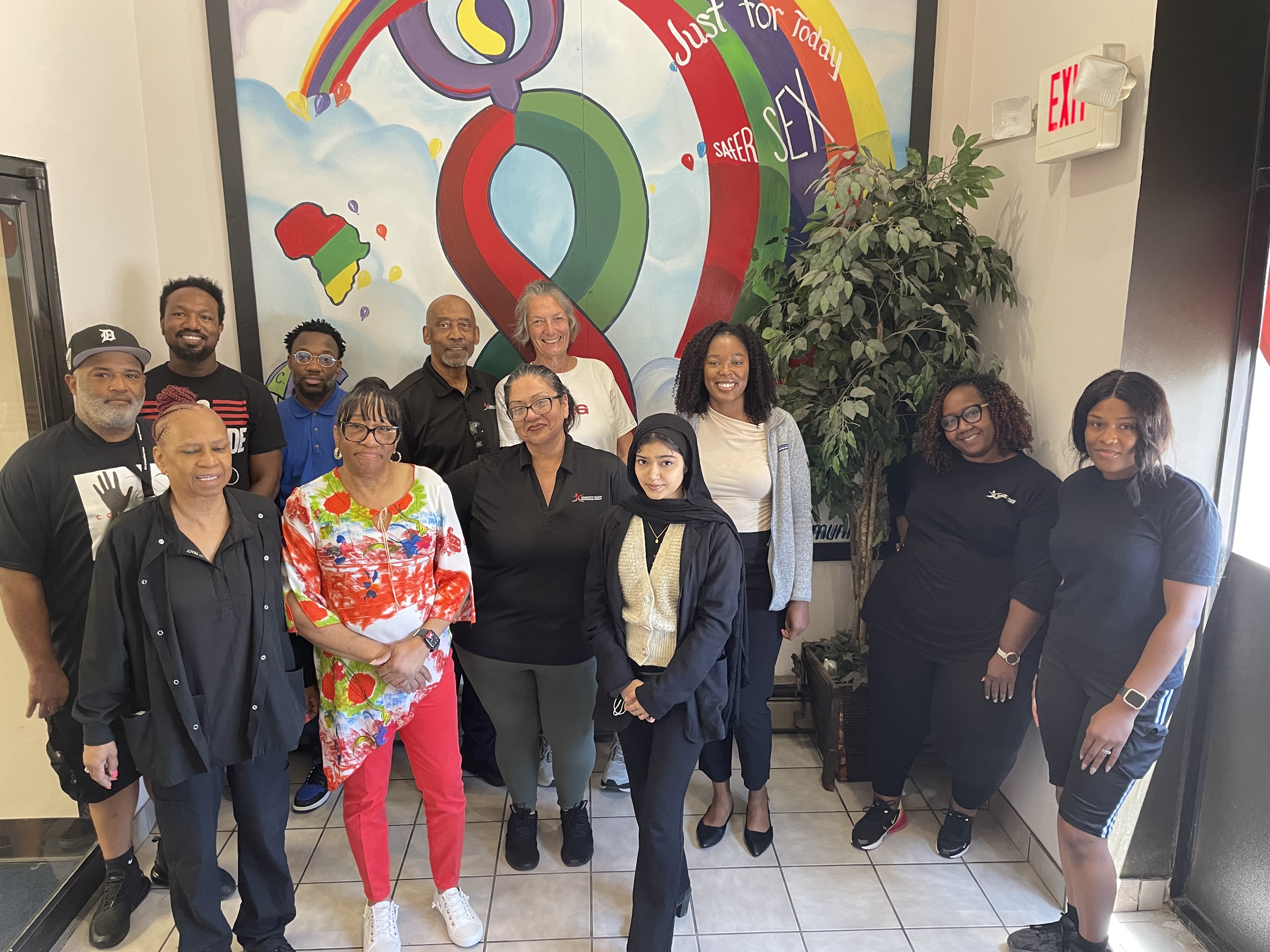WSU DFMPHS Faculty, Master of Public Health, Medical Students and Community Leaders Publish Detroit Substance Use Risk Reduction Engagement Initiative

Wayne State University (WSU) Department of Family Medicine and Public Health Sciences (DFMPHS), Master of Public Health (MPH) and WSU Medical School Students, and Detroit Community Health Awareness Group, Inc. (CHAG) community leaders celebrated a publication in the Journal of Substance Abuse Treatment, Prevention, and Policy (JSATPP) titled People who use drugs engagement in substance use disorder services and harm reduction: evaluation, challenges and future direction of a community-based intervention. Cindy Bolden Calhoun, co-author and CHAG Executive Director/CFO commended CHAG community health workers and leadership for their commitment to Detroit evaluation and research with WSU. She noted the research partnership began with WSU for over twenty years ago with the HIV/AIDS epidemic, and that results from an earlier joint publication of a Randomized controlled trial on HIV/AIDS counseling and risk reduction in the Michigan Journal of Public Health continued to be a foundation for the current research on substance use disorder risk reduction.
The JSATPP article is based on data collected by CHAG community health workers who conducted outreach with a sample of 55 people who use drugs. Substance use risk analysis was based on factors such as gender and age, exploring multiple factors influencing persons who use drugs, barriers to substance use disorder services, and access to harm reduction services. The convenience sample was composed of active participants in the CHAG LifePoints program. Participants reported use of heroin (98%), crack (51%), cocaine (47%), alcohol (25%), opioid (24%), marijuana (15%), and other drugs (18%) including weed and zany bars, crack, speed, speedball, and meth. The study highlighted some gender disparities between male (n=28, 51%), female (n=26, 48%) and transgender (n=1, 2%) participants. For example, results showed a higher percentage of females chose to engage in community mental health services and as well as reporting engaging in sex to meet basic social needs.
In the “Public Health Implications and Future Direction” section of the article, implications of substance use disorder for young adults were presented. This focus on young adults and youth is currently being addressed in a research development grant funded by the Wayne State University Office of the Vice President for Research (OVPR) titled “Youth Overdose Understanding Risks (YOURS)” grant to Julie Gleason-Comstock, PhD, MCHES. A proposed goal for future initiatives is to employ a community-based participatory research/randomized controlled trial approach empowering youth to address challenges focused on substance use prevention and overdose. The OVPR grant provides resources to continue gathering data around community health workers mentoring youth, partnering with youth-centered organizations, and provision of access to mental health counseling. DFMPHS and CHAG planning include the WSU College of Education Community Health Worker Academy, led by Dr. Nate McCaughtry, in recruitment of eligible young adults as community health workers, who would work with educational and community-based groups in Detroit/Wayne County to address substance use prevention among young adults.
The publication reflected mentoring of students in community-based participatory research in the DFMPHS Public Health Research Lab (PHRL), led by Dr. Gleason-Comstock. The PHRL long-term goal is to advance translational public health research in Greater Detroit. PHRL team members are mentored to utilize research tools including SPSS Statistics, Qualtrics, EndNote, and Covidence Systematic Reviews, with the goal of research publication and proposal development. In preparation for initially working with secondary data analysis, members are required to complete the WSU CITI Behavioral and Human Subjects Research Certification. The 2023-2024 dedicated team consists of nine members, including three WSU MPH students (Divya Boorle, Saad Ahmed Khan Lnu, Saba Salma Lnu), three WSU Medical School Students (Kevin Cobty, Tiffany McKenney, NGina McAlpin), two WSU Bachelor of Science in Public Health (BSPH) candidates (Nadija Basic, Kaji Uddin), and Ghadir Mozeb, a WSU BSPH Honors graduate who will be attending Michigan State University College of Human Medicine in 2024.
Dr. Boorle, who recently completed her MPH through DFMPHS, shared “I had a wonderful experience working with the public health research team at WSU. Our collaboration with the CHAG provided valuable insights into community challenges and how public health research can transform people’s lives for better living. This hands-on experience allowed me to apply what I learned in my classroom, especially in data analysis, drawing inferences, and providing future directions.” The Public Health Research Lab continues to expand its 2024-2025 team, welcoming interested graduate student in public and allied health and medical students. Web-based meetings are weekly with quarterly onsite meetings. For more information, please contact jgleason@med.wayne.edu.